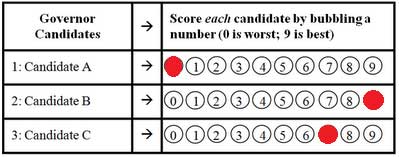
This is part two of a series analyzing the 12 best voting-systems. See the introductory article for the series here.
Suppose that a progressive voter prefers the Green Party’s Presidential candidate Jill Stein, but has been convinced that the winner always has to be the Democrat or the Republican. Then, the advantage of Approval Voting over Plurality, for hir, is that s/he can fully support Jill, while still fully supporting her perceived-necessary compromise, Hillary. But the downside is that Hillary is getting just as much from hir as Jill is. As I was saying before, your best vote in Approval is to approve all of the best candidates. But, in this case, the voter is over-compromising, and approving Hillary, whom the voter probably wouldn’t call “one of the best.”

I wouldn’t attribute that problem to Approval. It wouldn’t happen if that voter weren’t willing to approve someone whom she regards as less than one of the best. But it still might happen some in Approval.
But if the voting-system we used was Score Voting, with its flexible ratings, then that voter, who probably doesn’t feel good about approving Hillary, and who would definitely rather not rate Hillary as high as Jill, might with Score, rate Hillary at least a little below Jill.
That’s a distinct improvement.
What about rival parties? Say that there are 2 parties that are very similar, claiming the same position “territory”, but with a feeling of inimical rivalry. Maybe neither would be willing to approve the other. The result is an unnecessary “split-vote”.
But, if the voting system were Score, they might both be willing to rate each other below themselves, maybe considerably above bottom, maybe toward the top.
Either way, Score would soften voting-errors. Score would offer a way of voting that moderates a strategic vote that the voter doesn’t like. The voter might regard this as a compromise between the voter’s feelings about the candidates, and the strategy that s/he perceives necessary or has been told is necessary, but doesn’t really like.
So score voting offers a compromise between strategy and sincerity. It softens the harm that strategy could do, when that strategy isn’t really in the voter’s best interest.
Of course Approval is the voting-system that’s easily implementable, at no expense, and so it would probably be more practical to propose Approval. Also, an implementation of Score would have to include a choice of what the points-assignment range would be. With Approval, there’s no such choice to deal with.
There’s one obvious way to do Approval: Just re-adjust the software or equipment to not disregard or reject “overvotes”.
Leave a Reply